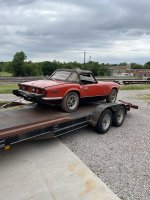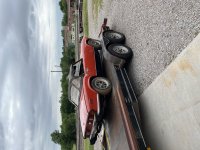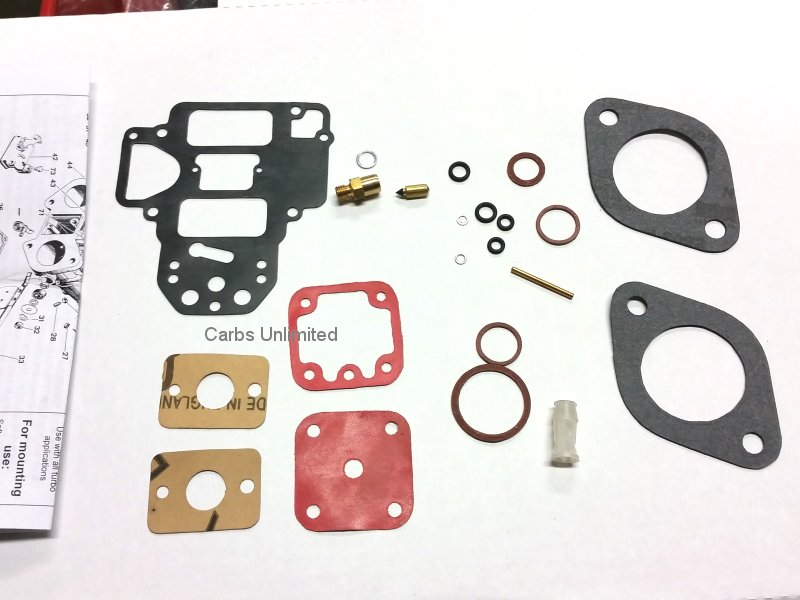I have not posted on this board in many years. Started this post in 2015: > Bought our first British car <
We still have that car and enjoy it from time to time.
Apparently, I only post when I acquire a British car. It has happened again.
Friend of mine died recently. He gave this to me a few years ago, but it remained at his place until yesterday. Took the wife and the grandsons and we drug it out from under a carport.
All original paint except the top half of the bonnet. You can tell it has been repainted. The rest of the paint is in good condition. The only rust is some bubbling on the LF fender. Car is incredibly dirty. Someone bought seat covers for it, but they are not fully installed. Just sitting on the seats. Engine and trans were both overhauled in the 90s and it has less than 2000 miles on it since then!!! They even installed an upgraded camshaft.
Car has been sitting a long time. I don't think it has been on the road since 2003. It is possible it was driven in 2012 or 13, when my friend acquired it. Left front wheel was locked up (I believe the pads were rusted stuck to the rotor) until we hit the first ladder brace on the car hauler ramp, when it broke loose. Rolled easily after that. Brakes and clutch hydraulics will need to be gone through.
Twin SU carbs have been "upgraded" to a single Weber 45 DCOE. Throttle shafts and choke lever are frozen. Soaked all with WD-40 today. Top is in remarkable condition. Just dirty. Pretty sure it is this kit, right down to the Longflow air filter: > Weber Side-Draft Carburetor Conversion Kit, 45 DCOE, Spitfire 1967-80 <
Still has the original 155 13 spare Goodyear, with "MADE IN GREAT BRITAIN" on the inside sidewall. I kind of like the aftermarket wheels. Tires will need replaced. The best news is that the engine is not locked up. It turns over freely just using the alternator pulley retaining nut. Oil is nice and clean. Both brake and clutch master cylinders are full to the brim with nice clean fluid, so that should minimize corrosion there.
I have not yet decided what to do with it. I really don't have time to do much, if I do anything. I just removed the body from the frame for a full resto on my 1970 LT-1 Corvette. Still working full time, and have taken on a monumental building restoration project in my small historic town. I am CEO of the State Capital Publishing Museum. I have another nine years to go on that project. Website here: > The State Capital Publishing Museum - Guthrie, Oklahoma <
If I decide to get it running, I will remove the spark plugs and valve cover. Will squirt some thin oil in the cylinders, and to my best to lube the rocker shafts and rocker arms. Will change the oil and filter, and crank if over by hand for a bit to see if I can get oil to the rockers. Then reinstall the plugs and valve cover, give it a crank with starter fluid and see if it fires. If it does, then I have the Weber to contend with. Looks like a lot of corrosion there. I have never messed with a Weber DCOE. Anything in particular I need to be aware of?
We still have that car and enjoy it from time to time.
Apparently, I only post when I acquire a British car. It has happened again.
Friend of mine died recently. He gave this to me a few years ago, but it remained at his place until yesterday. Took the wife and the grandsons and we drug it out from under a carport.
All original paint except the top half of the bonnet. You can tell it has been repainted. The rest of the paint is in good condition. The only rust is some bubbling on the LF fender. Car is incredibly dirty. Someone bought seat covers for it, but they are not fully installed. Just sitting on the seats. Engine and trans were both overhauled in the 90s and it has less than 2000 miles on it since then!!! They even installed an upgraded camshaft.
Car has been sitting a long time. I don't think it has been on the road since 2003. It is possible it was driven in 2012 or 13, when my friend acquired it. Left front wheel was locked up (I believe the pads were rusted stuck to the rotor) until we hit the first ladder brace on the car hauler ramp, when it broke loose. Rolled easily after that. Brakes and clutch hydraulics will need to be gone through.
Twin SU carbs have been "upgraded" to a single Weber 45 DCOE. Throttle shafts and choke lever are frozen. Soaked all with WD-40 today. Top is in remarkable condition. Just dirty. Pretty sure it is this kit, right down to the Longflow air filter: > Weber Side-Draft Carburetor Conversion Kit, 45 DCOE, Spitfire 1967-80 <
Still has the original 155 13 spare Goodyear, with "MADE IN GREAT BRITAIN" on the inside sidewall. I kind of like the aftermarket wheels. Tires will need replaced. The best news is that the engine is not locked up. It turns over freely just using the alternator pulley retaining nut. Oil is nice and clean. Both brake and clutch master cylinders are full to the brim with nice clean fluid, so that should minimize corrosion there.
I have not yet decided what to do with it. I really don't have time to do much, if I do anything. I just removed the body from the frame for a full resto on my 1970 LT-1 Corvette. Still working full time, and have taken on a monumental building restoration project in my small historic town. I am CEO of the State Capital Publishing Museum. I have another nine years to go on that project. Website here: > The State Capital Publishing Museum - Guthrie, Oklahoma <
If I decide to get it running, I will remove the spark plugs and valve cover. Will squirt some thin oil in the cylinders, and to my best to lube the rocker shafts and rocker arms. Will change the oil and filter, and crank if over by hand for a bit to see if I can get oil to the rockers. Then reinstall the plugs and valve cover, give it a crank with starter fluid and see if it fires. If it does, then I have the Weber to contend with. Looks like a lot of corrosion there. I have never messed with a Weber DCOE. Anything in particular I need to be aware of?

 Hi Guest!
Hi Guest!

 smilie in place of the real @
smilie in place of the real @
 Pretty Please - add it to our Events forum(s) and add to the calendar! >>
Pretty Please - add it to our Events forum(s) and add to the calendar! >> 



